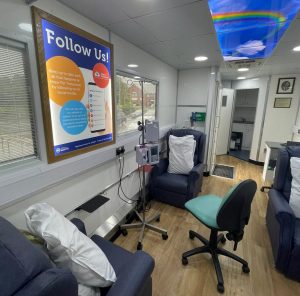The management of myeloma has changed significantly in recent years as more drugs for myeloma and its symptoms have become available through the NHS. These recent advances mean more patients receiving a wide variety of treatment from chemotherapy and immunotherapy to bisphosphonates. Furthermore, many of these treatments are given continuously further increasing the number of patients requiring regular treatment. While the increasing portfolio of treatments provides huge benefits in terms of disease and symptom control, higher patient numbers and increasingly complex treatment modalities have led to workload and capacity being exceptionally challenged on chemotherapy day units.
Claire Smith, Matron for Cancer at Salisbury NHS Foundation Trust told Myeloma UK more about the Trust mobile chemotherapy service, the Mobile Cancer Care Unit, and how it benefits myeloma patients. She also explains how the service responded to the challenges of the COVID-19 pandemic.
Taking cancer clinics on the road
The Mobile Cancer Care Unit (MCCU) was launched at Salisbury in September 2012 and was developed by the charity, Hope for Tomorrow, to deliver care closer to patients’ homes.
 The unit is a large bus based at Salisbury District Hospital and driven to three locations in Salisbury each week over four days.
The unit is a large bus based at Salisbury District Hospital and driven to three locations in Salisbury each week over four days.
It consists of three rooms: the main treatment area, a toilet and a small kitchen area.
Within the treatment area we have four chairs for four patients and typically have two nurses onboard.
We have a small area for education, advice and support if required. We also have a driver who is able to provide support to the clinical teams.
Services include administration of intravenous chemotherapy, immunotherapy and blood products. We also provide line care (PICC lines), take blood tests, manage symptoms and let patients collect medication so they can avoid travel to the main hospital in Salisbury
This means that patients treated on board the MCCU receive the same high quality of care that they would in the hospital setting, and still have access to specialist support services, such as the dietician or psychological support therapist.
The MCCU covers a very large catchment area of Wiltshire, Hampshire and Dorset enabling the hospital to effectively reach the elderly rural population. We have four clinics every week, two in Gillingham, one in Westbury and one in Fordingbridge treating approximately 180-200 cancer patients per month.
A less stressful service for patients
Patients and families who choose to use the MCCU, value the service greatly and express how attending the unit reduces their stress. The service not only reduces travel time and parking issues but also let patient receive treatment in a quieter, calmer and more relaxing environment than a busy day unit. We find the higher nurse/patient ratio makes it easier for patients and their families to discuss concerns or ask questions.
Helps myeloma patients tolerate long-term treatment
Many of the patients attending the MCCU are myeloma patients who come aboard to get blood tests, receive their myeloma treatments or for other treatment, such are PICC line care. The MCCU is equipped to administer subcutaneous, intravenous and oral myeloma treatments. The continuity of care with the nursing staff on the MCCU is helpful in regularly assessing patients and checking for any side effects of treatment, such as peripheral neuropathy, fatigue, bowel changes or infection.
This service is particularly beneficial to myeloma patients who are now on treatment for longer periods, with fewer treatment-free intervals, because the MCCU can help reduce trips to hospital which can significantly improve quality of life. Indeed, the specialist nurses on board feel that this helps many patients better tolerate their treatments which is crucial to patients staying on treatment and getting the optimal benefit.
Keeping patients safe during the COVID -19 pandemic
The COVID-19 pandemic has impacted every aspect of cancer care, with myeloma patients having the additional worry about ‘staying safe’ whilst continuing their treatment. Since March 2020, the MCCU has been a key asset to our Trust, enabling patients to have their treatment in a non-hospital environment. We have also been able to take blood tests and COVID-19 swabs on the MCCU, further minimising hospital visits.
To continue the service during the pandemic the team on the MCCU reviewed and adapted how care on the MCCU was delivered. The space was rearranged with a chair being removed to maintain adequate social distancing. Processes were also adapted with all patients having their temperature checked before entering the treatment area and since December 2020, all patients attending for systemic anti-cancer treatment (SACT) had a viral swab taken two days before their treatment date. Other protective measures introduced include a review of scheduling to prevent overlap between patients and the use of protective equipment for the clinical team and face masks for patients.
All this has ensured that infection control was maintained and that the nurses were able to continue to deliver chemotherapy and other treatments to patients safely and comfortably.
Developing the service
Having seen how the MCCU improves patient care we are looking to expand our patient services to include the administration of blood products and long-term antibiotics.
We are also working with primary care to develop an education programme for general nurses in the community. The programme will include training on the care of central venous access devices, management of common chemotherapy-related toxicities and symptom management.
The MCCU is an asset for Salisbury District Hospital and continues to provide crucial care for myeloma patients nearer to their homes, enabling them to spend more time with their family, friends and loved ones.

Written by Claire Smith
Matron for Cancer
Salisbury NHS Foundation Trust






